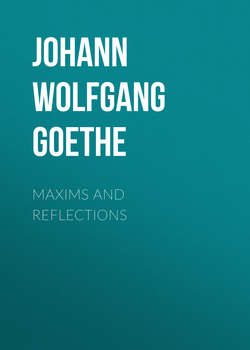Maxims and Reflections

Реклама. ООО «ЛитРес», ИНН: 7719571260.
Оглавление
Johann Wolfgang von Goethe. Maxims and Reflections
TRANSLATOR'S PREFACE
I
II
III
LIFE AND CHARACTER
I
II
III
IV
V
VI
VII
LITERATURE AND ART
SCIENCE
NATURE: APHORISMS
Отрывок из книги
The translation of Goethe's "Prose Maxims" now offered to the public is the first attempt that has yet been made to present the greater part of these incomparable sayings in English. In the complete collection they are over a thousand in number, and not more perhaps than a hundred and fifty have already found their way into our language, whether as contributions to magazines here and in America, or in volumes of miscellaneous extract from Goethe's writings. Some are at times quoted as though they were common literary property. To say that they are important as a whole would be a feeble tribute to a work eloquent for itself, and beyond the need of praise; but so deep is the wisdom of these maxims, so wide their reach, so compact a product are they of Goethe's wonderful genius, that it is something of a reproach to literature to find the most of them left untranslated for the sixty years they have been before the world. From one point of view, the neglect they have suffered is in no way surprising: they are too high and severe to be popular so soon; and when they meet with a wide acceptance as with other great works, much of it will rest upon authority. But even for the deeper side of his writings, Goethe has not been denied a fair measure of popular success. No other author of the last two centuries holds so high a place, or, as an inevitable consequence, has been attacked by so large an army of editors and commentators; and it might well be supposed by now that no corner of his work, and least of all one of the best, had remained almost unnoticed, and to the majority unknown. Many of these maxims were early translated into French, but with little success; and even in Germany it was only so late as the year 1870 that they appeared in a separate form, with the addition of some sort of critical comment and a brief explanation of their origin and history.1
But although to what is called the reading public these maxims are as yet, no less in fact than in metaphor, a closed book, its pages have long been a source of profit and delight to some of those who are best able to estimate their value. What that value is, I shall presently endeavour to explain. No one, I think, can perceive their worth without also discerning how nearly they touch the needs of our own day, and how greatly they may help us in facing certain problems of life and conduct, some of them, in truth, as old as the world itself, which appear to us now with peculiar force and subtlety.
.....
The maxims on Science and Art are, however, when taken together, hardly a fifth of this volume. The others I have selected on the simple and I hope blameless principle of omitting only what is clearly unimportant, antiquated, of past or passing interest, of purely personal reference, or of a nature too abstruse to stand without notes of explanation, which I should be sorry to place at the foot of any of these pages. I have also omitted eleven maxims drawn from Hippocrates On Diet; fifteen containing an appreciation of Sterne, together with some twenty more which Goethe himself translated from a curious work wrongly attributed to that writer. It will be convenient if I state that I have thus omitted some hundred and twenty out of the six hundred and fifty-five which make up the section styled in the original Ethisches, which I translate by Life and Character, the section which also contains the maxims on Literature, now collected and placed in a separate section with those on Art. Sir Frederick Leighton chose thirty-five out of a hundred and eighteen on Art, and Professor Huxley seventy-six out of two hundred and eighty on Science.
For sixty years this essay has stood unquestioned in Goethe's works; but doubt has recently been cast on its authorship. The account hitherto given rests upon the excellent ground of Goethe's own declaration. The essay, it appears, was written about the year 1780, and offered to the Duchess Amalia. Some time after her death it was found amongst her papers, and sent to Goethe in May, 1828, when, as he wrote to his friend the Chancellor von Müller, he could not remember having composed it; although he recognised the writing as that of a person of whose services he used to avail himself some forty years previously. That at so great a distance of time a prolific author could not recall the composition of so short a piece is not, indeed, improbable; but Goethe proceeded to say that it agreed very well with the pantheistic ideas which occupied him at the age of thirty, and that his insight then might be called a comparative, which was thus forced to express its strife towards an as yet unattained superlative. Notwithstanding this declaration, the essay is now claimed as the production of a certain Swiss friend of Goethe's, by name Tobler, on external evidence which need not be examined here, and on the internal evidence afforded by the style, which is certainly more pointed and antithetic than is usual with Goethe. But a master of language who attempted every kind of composition may well have attempted this; and even those who credit an otherwise unknown person with the actual writing of the essay candidly admit that it is based upon conversations with Goethe. It is so clearly inspired with his genius that he can hardly be forced to yield the credit of it to another.
.....